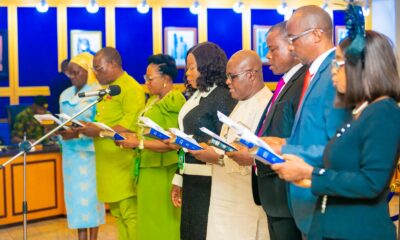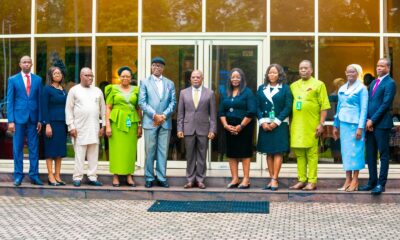Featured
N241bn Security Votes, Unaccounted For Annually, Says Anti-Graft Watchdog …Calls For Law To Ban Unconstitutional Practice
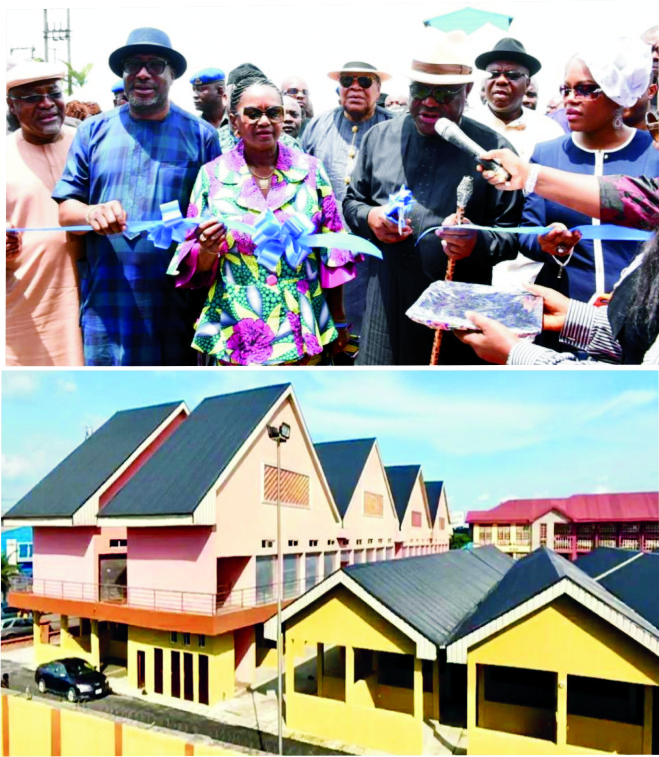
An international anti-corruption watchdog, Transparency International (TI), has raised alarm over N241.2billion annually spent on security votes not accounted for by the government in Nigeria.
This was contained in a report published, yesterday, by TI with the theme, ‘Camouflaged Cash, How Security Votes’ Fuel Corruption in Nigeria’.
According to the report, security votes are opaque corruption-prone security funding mechanisms widely used by Nigerian officials as extra-budgetary expenditures.
The report reads in part, “A relic of military rule, these funds are provided to certain federal, state and local government officials to disburse at their discretion. In theory, they are reserved for covering unforeseen security needs.
“Transacted mostly in cash, security vote spending is not subject to legislative oversight or independent audit because of its ostensibly sensitive nature. Although officials often spend some of these funds on security, they also channel them into political activities or embezzle them outright.
“Among average Nigerians, the words ‘security vote’ is synonymous with official corruption and abuse of power. Yet, the beneficiaries, politicians and security officials-argue that are needed to subsidise the operations of Nigeria’s overstretched and underfunded federal security agencies.
“State officials claim this practice is necessary but nevertheless allows the Federal Government to shift the cost of national security activities onto the states with no accountability for how those funds are spent.
“As a result, it has become a ‘cancerous tumour’ in the state budget, according to one senior state official.
“Our analysis of 29 state budgets (no data exists for seven states) reveals they spend an average of $580million (N208.8billion) in total each year on security votes. Federal Government security votes average over $50million (N18billion) annually.
“Assuming the chairpersons of Nigeria’s 774 local government areas each receive on average $56, 000 (N20million) in security vote funding each year, that of the local government would amount to another $42.6million.”
The report also noted that the sum total of Nigeria’s various security votes dwarfs the international security assistance it receives and is comparable to budgeted spending on national defence and security institutions.
“In just one year, these cash-in, extra-budgetary, expenditures add up to over nine times the amount of the US security assistance to Nigeria since 2012 ($68.6million) and over 12 times the $53.5million (£40million) in counter-terrorism support the UK promised Nigeria from 2016-2020.
“Looking at it from another angle, spending exceeds 70 per cent of the annual budget of the Nigeria Police Force, more than the Nigerian Army annual budget, and more than the Nigerian Navy and Nigerian Air Force’s annual budget combined”, the reported added.
Meanwhile, TI, in the report, also cautioned President Muhammadu Buhari, on curtailing widespread use of security votes if he wants to fight corruption effectively.
The global anti-graft watchdog said, “In December, 2017, the government announced the withdrawal of $1billion from the Excess Crude Account, nearly half of Nigeria’s dwindling rainy day fund for ad hoc security expenditures.
“Likewise Buhari has increased the number of security votes tucked into the federal budget from about 30 to over 190 in 2018. The total value of these votes increased from $46.2billion (N9.3billion at the time) to $51million (N18.4billion now) over those two years.
“If President Buhari is serious reining in official corruption in Nigeria, he has the opportunity to curtail his own government’s widespread use of security votes.”
Giving recommendations on how to tackle alleged corrupt practices by government officials by embezzling public funds through security votes the report recommended that, “Pass federal legislation outlawing security votes at the federal and local levels. A ban on the use of security votes; monitor confidential security spending.
“If it is so important for national security that a proportion of federal and state’s security budgets remains secret, then it is should be equally important that is spent effectively; educate officials, leaders and the general public about the risks and drawbacks of using security votes; support state government efforts to set up Security Trust Funds (STFs) as constructive first step toward phasing out security votes.”
Featured
Rivers A Strategic Hub for Nigeria’s Blue Economy -Ibas …Calls For Innovation-Driven Solutions
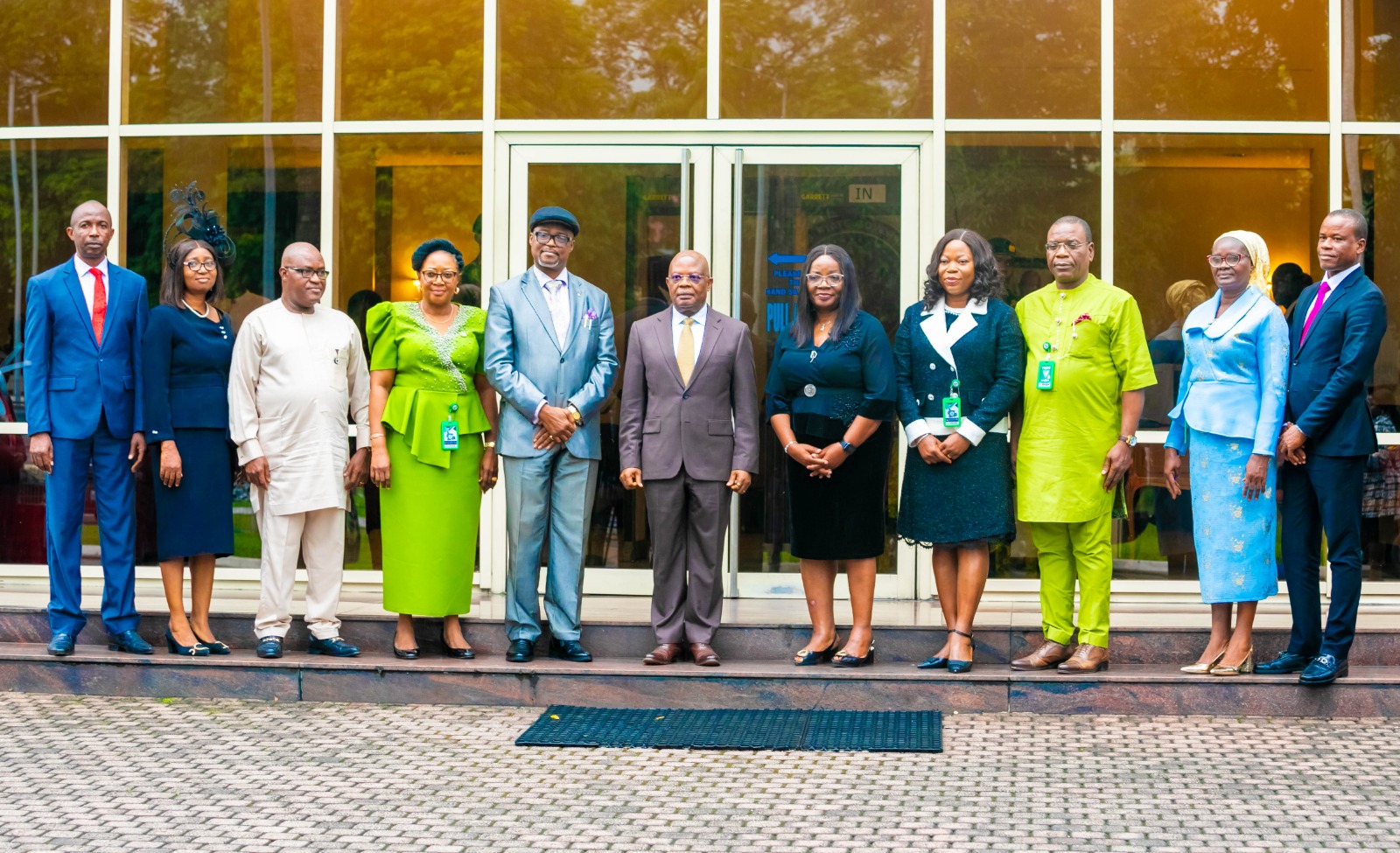
The Administrator of Rivers State, Vice Admiral (Rtd.) Ibok-Ete Ibas, has emphasized the need for innovation-driven strategies, strategic partnerships, and firm policy implementation to fully harness the vast potential of the blue economy.
Speaking during a courtesy visit by participants of Study Group 7 of the Executive Course 47 from the National Institute for Policy and Strategic Studies (NIPSS) at Government House, Port Harcourt, on Monday, Ibas highlighted the importance of diversifying Nigeria’s economy beyond oil by leveraging maritime resources to create jobs, enhance food security, strengthen climate resilience, and generate sustainable revenue.
The Administrator, according to a statement by his Senior Special Adviser on Media, Hector Igbikiowubo, noted that with coordinated efforts and innovative solutions, the blue economy could serve as a catalyst for inclusive growth, economic stability, and long-term environmental sustainability.
“It is estimated that a fully developed blue economy could generate over $296 million annually for Nigeria, spanning fisheries, shipping and logistics, marine tourism, offshore renewable energy, aquaculture, biotechnology, and coastal infrastructure,” he stated.
“We must transition from extractive practices to regenerative, inclusive, and innovation-driven solutions. This requires political cohesion, intergovernmental collaboration, robust infrastructure, and institutional capacity—all of which must be pursued with urgency and intentionality,” he added.
Ibas urged sub-national governments, particularly coastal states, to domesticate the national blue economy framework and develop tailored strategies that reflect their comparative advantages.
He stressed that such efforts must be guided by disciplined planning, regulation, and investment to maximize the sector’s potential.
Highlighting Rivers State’s pivotal role, the Administrator outlined its strategic advantages as follows:
•Nearly 30% of Nigeria’s total coastline (approximately 853km)
•Over 40% of Nigeria’s crude oil and gas output
•More than 33% of the country’s GDP and foreign exchange earnings
•416 of Nigeria’s 1,201 oil wells, many located in marine environments
•Two of Nigeria’s largest seaports, two oil refineries, and the Nigerian Liquefied Natural Gas (NLNG) terminal in Bonny Island—one of Africa’s most advanced gas facilities
Despite these opportunities, Ibas acknowledged challenges such as pollution, coastal erosion, illegal oil refining, unregulated fishing, inadequate infrastructure, and maritime insecurity.
He reaffirmed his administration’s commitment to institutional reforms, coastal zone management, and inter-agency collaboration to build a governance structure that supports a sustainable blue economy.
“Sustainability must be embedded in our development models from the outset, not as an afterthought. We are actively exploring partnerships in maritime education, aquaculture development, port modernization, and renewable ocean energy. We welcome knowledge-sharing engagements like this to refine our strategies and enhance implementation,” he said.
He urged the NIPSS delegation to ensure their findings translate into actionable recommendations that address the sector’s challenges.
Leader of the delegation, Vice Admiral A.A. Mustapha, explained that the visit aligns with their strategic institutional tour mandate on the 2025 theme: “Blue Economy and Sustainable Development in Nigeria: Issues, Challenges, and Opportunities.”
The group is engaging stakeholders to deepen understanding of policy efforts and institutional roles in advancing sustainable development through the blue economy.
Featured
INEC To Unveil New Party Registration Portal As Applications Hit 129

The Independent National Electoral Commission (INEC) has announced that it has now received a total of 129 applications from associations seeking registration as political parties.
The update was provided during the commission’s regular weekly meeting held in Abuja, yesterday.
According to a statement signed by the National Commissioner and Chairman of the Information and Voter Education Committee, Sam Olumekun, seven new applications were submitted within the past week, adding to the previous number.
“At its regular weekly meeting held today, Thursday 10th July 2025, the commission received a further update on additional requests from associations seeking registration as political parties.
“Since last week, seven more applications have been received, bringing the total number so far to 129. All the requests are being processed,” the commission stated.
The commission revealed the introduction of a new digital platform for political party registration. The platform is part of the Party Financial Reporting and Auditing System and aims to streamline the registration process.
Olumekun disclosed that final testing of the portal would be completed within the next week.
“INEC also plans to release comprehensive guidelines to help associations file their applications using the new system.
“Unlike the manual method used in previous registration, the Commission is introducing a political party registration portal, which is a module in our Party Financial Reporting and Auditing System.
“This will make the process faster and seamless. In the next week, the commission will conclude the final testing of the portal before deployment.
“Thereafter, the next step for associations that meet the requirements to proceed to the application stage will be announced. The commission will also issue guidelines to facilitate the filing of applications using the PFRAS,” the statement added.
In the meantime, the list of new associations that have submitted applications has been made available to the public on INEC’s website and other official platforms.
Featured
Tinubu Signs Four Tax Reform Bills Into Law …Says Nigeria Open For Business

President Bola Tinubu yesterday signed into law four tax reform bills aimed at transforming Nigeria’s fiscal and revenue framework.
The four bills include: the Nigeria Tax Bill, the Nigeria Tax Administration Bill, the Nigeria Revenue Service (Establishment) Bill, and the Joint Revenue Board (Establishment) Bill.
They were passed by the National Assembly after months of consultations with various interest groups and stakeholders.
The ceremony took place at the Presidential Villa, yesterday.
The ceremony was witnessed by the leadership of the National Assembly and some legislators, governors, ministers, and aides of the President.
The presidency had earlier stated that the laws would transform tax administration in the country, increase revenue generation, improve the business environment, and give a boost to domestic and foreign investments.
“When the new tax laws become operational, they are expected to significantly transform tax administration in the country, leading to increased revenue generation, improved business environment, and a boost in domestic and foreign investments,” Special Adviser to the President on Media, Bayo Onanuga said on Wednesday.
Before the signing of the four bills, President Tinubu had earlier yesterday, said the tax reform bills will reset Nigeria’s economic trajectory and simplify its complex fiscal landscape.
Announcing the development via his official X handle, yesterday, the President declared, “In a few hours, I will sign four landmark tax reform bills into law, ushering in a bold new era of economic governance in our country.”
Tinubu made a call to investors and citizens alike, saying, “Let the world know that Nigeria is open for business, and this time, everyone has a fair shot.”
He described the bills as not just technical adjustments but a direct intervention to ease burdens on struggling Nigerians.
“These reforms go beyond streamlining tax codes. They deliver the first major, pro-people tax cuts in a generation, targeted relief for low-income earners, small businesses, and families working hard to make ends meet,” Tinubu wrote.
According to the President, “They will unify our fragmented tax system, eliminate wasteful duplications, cut red tape, restore investor confidence, and entrench transparency and coordination at every level.”
He added that the long-standing burden of Nigeria’s tax structure had unfairly weighed down the vulnerable while enabling inefficiency.
The tax reforms, first introduced in October 2024, were part of Tinubu’s post-subsidy-removal recovery plan, aimed at expanding revenue without stifling productivity.
However, the bills faced turbulence at the National Assembly and amongst some state governors who rejected its passing in 2024.
At the NASS, the bills sparked heated debate, particularly around the revenue-sharing structure, which governors from the North opposed.
They warned that a shift toward derivation-based allocations, especially with VAT, could tilt fiscal balance in favour of southern states with stronger consumption bases.
After prolonged dialogue, the VAT rate remained at 7.5 per cent, and a new exemption was introduced to shield minimum wage earners from personal income tax.
By May 2025, the National Assembly passed the harmonised versions with broad support, driven in part by pressure from economic stakeholders and international observers who welcomed the clarity and efficiency the reforms promised.
In his tweet, Tinubu stressed that this is just the beginning of Nigeria’s tax evolution.
“We are laying the foundation for a tax regime that is fair, transparent, and fit for a modern, ambitious Nigeria.
“A tax regime that rewards enterprise, protects the vulnerable, and mobilises revenue without punishing productivity,” he stated.
He further acknowledged the contributions of the Presidential Fiscal Policy and Tax Reform Committee, the National Assembly, and Nigeria’s subnational governments.
The President added, “We are not just signing tax bills but rewriting the social contract.
“We are not there yet, but we are firmly on the road.”
-
Politics21 hours ago
Alleged Money Laundering: Fayose Has No Case To Answer, Court Tells EFCC
-

 Politics17 hours ago
Politics17 hours agoAtiku Quits PDP, Says Decision Heartbreaking
-
Rivers21 hours ago
CDS Urges Communities To Protect Pipelines
-
Politics22 hours ago
Atiku’s Exit No Problem To PDP – Makinde
-

 News19 hours ago
News19 hours agoShettima, Atiku, Obi Attend Buhari’s Fidau Prayer In Daura
-
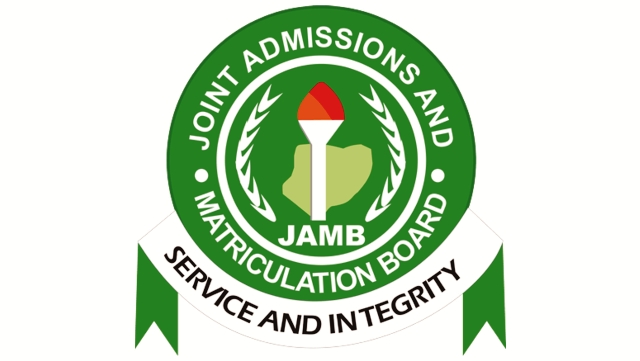
 News21 hours ago
News21 hours agoJAMB Uncovers 9,469 Fake Admissions In 20 Tertiary Institutions
-
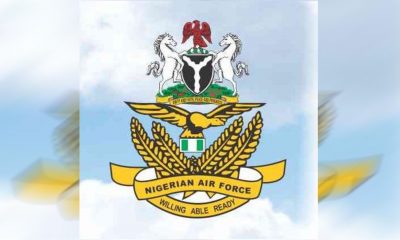
 News21 hours ago
News21 hours agoNAF Disowns Recruitment Adverts, Says It’s Fake
-
Rivers22 hours ago
Okrika Administrator Seeks To Connect Okujagu Ama To National Grid … Donates 30 Life Jackets To Okujagu Ama Boat Drivers


